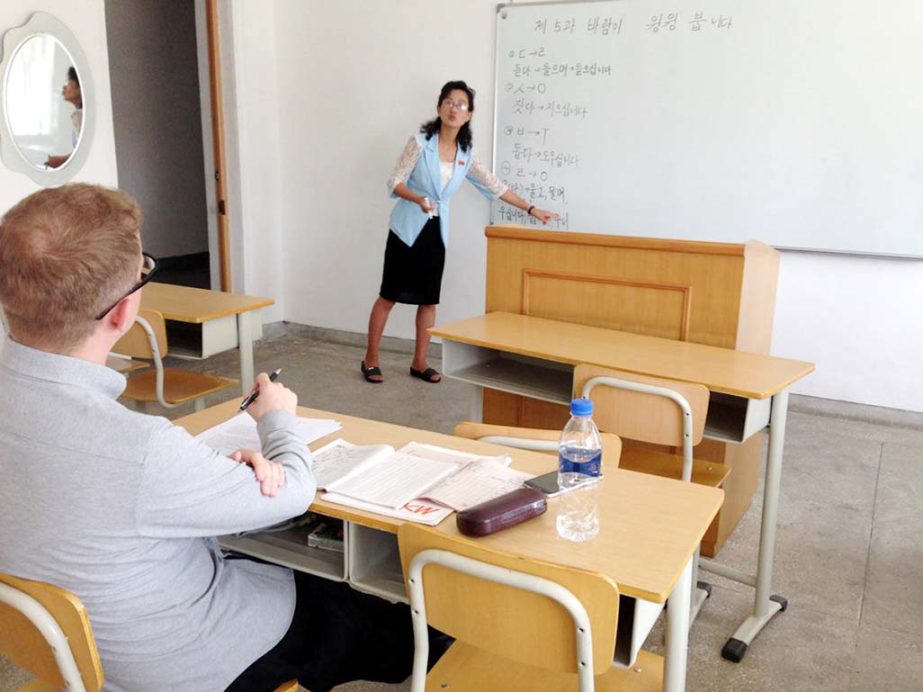
Joanna Hughes :
A major North Korean university has plans to open its doors to more international students, according to Edu-Active based on a report from Choson Singo, a North Korea-facing Japanese news source. Here’s a closer look at this possible development on the international education scene.
Adopting a More Liberal Approach?
While North Korea remains enmeshed in international conflict, some posit that the country may be adopting a more liberal approach to international exchange.
Specifically, while foreign students in North Korea are limited to Korean language studies, they may soon be allowed to choose from a variety of courses, including history, law, and economics, at Kim II Sung University, the alma mater of Kim Jong Un. Currently, approximately 100 international students are enrolled there — primarily from countries like China, Russia and Vietnam, which have ties with North Korea.
Or Merely an Attempt to Change Perceptions?
Contends Edu-Active, “The university advertises its international outlook on its website, with a focus on how the university is open to international academic cooperation and exchange.”
Additionally, the website includes an invitation to the “International Forum and International Symposium in celebration of the 70th Anniversary of Kim Il Sung University,” which could be viewed as an attempt at international outreach.
Furthermore, continues Edu-Active, “Another key to understanding how the university (and nation) embrace internationalization can be seen under the ‘Great Leadership’ tab. Titled ‘Fatherly Love for Exchange Students’, the document gives a description of a meeting between the first North Korean leader and Vietnamese students. ‘Kim Il Sung manifested an enormous support to and solidarity with the Vietnamese people after the Korean War including the offer of providing free education to the Vietnamese exchange students.'”
However, Asian international experts caution that the policy change may be less about opening the door to international students, and more about the desire to change perceptions about North Korea’s closedness to international influences. The true motivations for the shift, they say, may yet to be seen.
A major North Korean university has plans to open its doors to more international students, according to Edu-Active based on a report from Choson Singo, a North Korea-facing Japanese news source. Here’s a closer look at this possible development on the international education scene.
Adopting a More Liberal Approach?
While North Korea remains enmeshed in international conflict, some posit that the country may be adopting a more liberal approach to international exchange.
Specifically, while foreign students in North Korea are limited to Korean language studies, they may soon be allowed to choose from a variety of courses, including history, law, and economics, at Kim II Sung University, the alma mater of Kim Jong Un. Currently, approximately 100 international students are enrolled there — primarily from countries like China, Russia and Vietnam, which have ties with North Korea.
Or Merely an Attempt to Change Perceptions?
Contends Edu-Active, “The university advertises its international outlook on its website, with a focus on how the university is open to international academic cooperation and exchange.”
Additionally, the website includes an invitation to the “International Forum and International Symposium in celebration of the 70th Anniversary of Kim Il Sung University,” which could be viewed as an attempt at international outreach.
Furthermore, continues Edu-Active, “Another key to understanding how the university (and nation) embrace internationalization can be seen under the ‘Great Leadership’ tab. Titled ‘Fatherly Love for Exchange Students’, the document gives a description of a meeting between the first North Korean leader and Vietnamese students. ‘Kim Il Sung manifested an enormous support to and solidarity with the Vietnamese people after the Korean War including the offer of providing free education to the Vietnamese exchange students.'”
However, Asian international experts caution that the policy change may be less about opening the door to international students, and more about the desire to change perceptions about North Korea’s closedness to international influences. The true motivations for the shift, they say, may yet to be seen.
(Joanna worked in higher education administration for many years at a leading research institution before becoming a full-time freelance writer. She lives in the beautiful White Mountains region of New Hampshire with her family).

